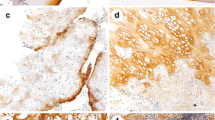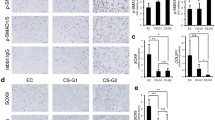Abstract.
It has been shown that transforming growth factor-β (TGF-β) has a potent stimulatory effect on the growth of chondrosarcoma cells in vitro. In order to examine the production of this family of growth factors and their receptors in vivo, we studied the expression of TGF-β isoforms 1, 2, and 3 and of TGF-β receptor types I and II (TGF-βRI and TGF-βRII) in a series of 24 chondrosarcomas of bone using immunohistochemistry and reverse-transcription polymerase chain reaction analysis. For comparison, five enchondromas and five osteochondromas were also analyzed. TGF-β1 was expressed in 3 benign lesions (30%) and 18 chondrosarcomas (75%), with a significantly higher expression in grade-2 and -3 tumors than in grade-1 tumors (P=0.002). TGF-β2 was identified in 8 benign lesions (89%) and 21 chondrosarcomas (87.5%), with increased expression in grade-2 and -3 chondrosarcomas in comparison with grade-1 tumors (P=0.05). TGF-β3 was detected in 6 benign lesions (60%) and 17 chondrosarcomas (70.8%), with no significant differences between chondrosarcomas of different histologic grade (P=0.6). Twenty-three chondrosarcomas (95.8%) expressed both TGF-β receptor types I and II. Reverse-transcription polymerase chain reaction analysis performed on ten chondrosarcomas confirmed the presence of low or absent levels of TGF-β1 and -β2 mRNA in grade-1 chondrosarcomas, while grade-2 chondrosarcomas presented high levels of transcript of both cytokines. High levels of TGF-βRI and RII mRNA were also detected. Chondrosarcomas with TGF-β1 and TGF-β2 overexpression (>20% of tumor cells) had a significantly higher expression of the cell proliferation marker MIB-1 (P=0.006 and P=0.0003, respectively), while no significant correlation was found between TGF-β3 expression and proliferative activity (P=0.5). When TGF-β isoform and receptor expression were examined with respect to disease-free survival, TGF-β1 overexpression was significantly associated with a shorter disease-free survival (P=0.004, log-rank test). Our data indicate that TGF-β isoforms are produced by neoplastic cells of chondrosarcomas and could have a potential role as autocrine growth stimulators in these neoplasms.
Similar content being viewed by others
Author information
Authors and Affiliations
Additional information
Electronic Publication
Rights and permissions
About this article
Cite this article
Masi, L., Malentacchi, C., Campanacci, D. et al. Transforming growth factor-β isoform and receptor expression in chondrosarcoma of bone. Virchows Arch 440, 491–497 (2002). https://doi.org/10.1007/s00428-001-0544-2
Received:
Accepted:
Published:
Issue Date:
DOI: https://doi.org/10.1007/s00428-001-0544-2




